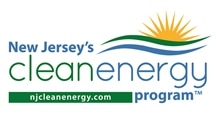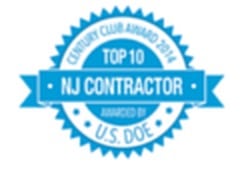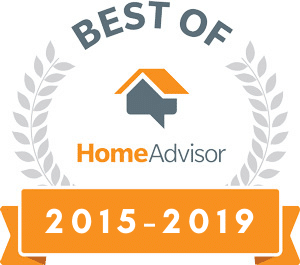- 1. Home Energy Audit
- 2. Blower Door Test
- 3. High Efficiency Heating and Cooling Systems
- 1. What does a home energy audit include?More
Your NJ Energy Audit will include:
- A thorough health and safety test including testing all combustion appliances such gas furnaces, water heaters and gas ovens. This includes a CO test (carbon monoxide), checking for gas leaks and an overall evaluation of the efficiency and general condition of all gas and main electrical appliances. In addition, the home is checked for possible mold and mildew problems.
- Measuring the insulation (R-values) throughout the different areas of your home, such as the attic, and checking for poor coverage areas, correct ventilation, and an overall assessment of any blow in insulation and/or fiberglass batts insulation
- Measuring your home’s air leakage rate with a Blower Door test to determine if air sealing is needed to improve the homes energy efficiency
- Review your past utility bills to determine the potential savings using an advanced NJ Home Performance with Energy Star computer modeling program
- Evaluate your lighting and appliances and making recommendations
- Provide you information and documentation on any rebates available from NJ or any federal tax rebates you could qualify for based on energy efficiency improvements you make
We will evaluate the energy efficiency of your home using diagnostic equipment such as blower doors, thermal leak detectors, CO analyzers and in some cases infrared cameras. During these evaluations we can show you where energy escapes your home so you can concentrate on improvements that are meaningful and will not only save you money on your energy bills but also make your home more comfortable for years to come.
Since we are based in South Jersey we understand the unique whether conditions of the NJ region. We focus in a radius of approximately 60 miles from our Williamstown NJ office.
We look forward to helping you improve the comfort save money on your energy bills at the same time. Call us today to set up your professional audit!
- 2. What can I expect during my energy audit?More
A Residential Energy Audit consists of two phases:
Phase 1: During the first phase of the audit, a BPI auditor assesses your home as a “total home system,” completes a thorough inspection of the living space, attic, basement (or crawl spaces) and performs a number of diagnostic tests including blower door depressurization, thermal leak detection and in some cases, infra-red imagery. The analyst will also check the air quality on combustion (gas) appliances for carbon monoxide levels and insure the home maintains proper air flow / ventilation. All of the information is then inputted into a software program and a report will be generated on the current condition of your home.
Phase 2: The second phase consists of using the results from the assessment to develop a work scope for proposed improvements, including an energy savings analysis. We will look at your past energy consumption to determine what the potential savings could be and then we will recommend improvements that will determine your pay back on your investment. The most cost-effective measures are usually air sealing and adding insulation, but there are other services we may recommend depending on the circumstances in accordance with the Home Performance with ENERGY STAR program.
Because NJ state program rebates are based on the total estimated percent of energy saved (as revealed in the audit), we look for every opportunity possible to save energy so that you get the maximum rebate available when we install the improvements.
A key advantage we have over other firms is we specialize in working in the Southern and Central New Jersey region.
- 3. Who should consider getting a home energy audit?More
If you have comfort problems or if your utility bill is too high, then a home energy audit is for you!
The Insulation-Heating & Cooling Group’s home energy audit uses sophisticated equipment to look at how and where your home leaks expensive conditioned air, where your insulation layer is not well installed or is too thin, as well as the efficiency of your heating and cooling equipment. We will check for any safety problems with your combustion appliances and look for causes of actual or potential mold / mildew growth. Our goal is to look at your home’s thermal performance to see where it can be improved.
A home energy audit will educate you about your home and how it functions. Our recommendations are based on tested and proven methods established by the Building Performance Institute (BPI) and the New Jersey Clean Energy Program.
- 1. What is a blower door test?More
A blower door is a powerful fan that mounts into the frame of an exterior door. The fan pulls air out of the house, lowering the air pressure inside. The higher outside air pressure then flows in through all unsealed cracks and openings in the home. The TIG auditor may use a smoke stick to help further detect air leaks. These tests determine the air infiltration rate of the home and where leaks are occurring.
Additionally, a blower door test can also help determine air leakage or disconnections in supply ducts and returns as well as lack of insulation value.
You can watch a detailed overview of what a blower door test includes in the videos at the right of this page. The blower door test is the final part of a complete home energy assessment which includes safety testing for CO levels, proper ventilation, adequate insulation levels and more.
- 1. How can I maintain my new high efficiency heating system?More
- Change your heating system’s filters at least twice a year. Dirty filters aren’t good for the system or for your home’s air.
- An annual tune-up is a must. A tune-up keeps your heating system running efficiently, prevents expensive and inconvenience breakdowns, and prolongs the life of your equipment.
- Set your programmable thermostat. Reduce temperatures when you are not home and when you are sleeping. Setting your system to your schedule will save you money and reduce the wear and tear that drastic temperature changes can have on your system.
- Keep it clean. If your unit is inside, keep it clear or heavy lint, dust and dirt. If your unit is outside, keep it clean of leaves, branches and other debris.
- Be sure that your outside vents aren’t blocked. Partially blocked vents can be bad for the equipment and totally blocked vents can be dangerous.
 Frequently Asked Questions
Frequently Asked Questions





